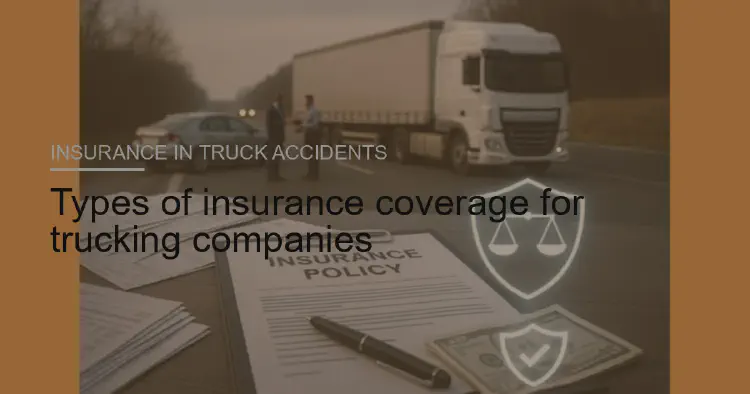Types of insurance coverage for trucking companies
Because of the high risks and potential damages associated with commercial trucking, companies are required to carry specialized insurance policies. These cover not only the trucks themselves but also the wide range of liabilities that can arise after an accident.
- Truck Accident Law Team
- 2 min read
Article 1 of 6 in Insurance in Truck Accidents/

Types of Insurance Coverage for Trucking Companies
1. Primary Liability Insurance
- Required by federal law for all commercial carriers.
- Covers bodily injury and property damage caused to others in an accident.
- Does not cover the truck driver’s own injuries or damage to company vehicles.
2. General Liability Insurance
- Covers accidents and injuries that occur outside of direct trucking operations (e.g., accidents on company premises, loading dock injuries).
- Provides broader protection beyond highway collisions.
3. Physical Damage Insurance
- Protects the trucking company’s own vehicles.
- Covers repairs or replacement costs if trucks are damaged by accidents, theft, fire, or natural disasters.
4. Cargo Insurance
- Covers damage to or loss of freight being transported.
- Particularly important when shipping valuable or hazardous goods.
- May be required by shippers or brokers before contracts are issued.
5. Bobtail/Non-Trucking Liability Insurance
- Covers a truck when it is operated without a trailer or outside of commercial hauling activities.
- Provides protection when the vehicle is being used for personal or non-business purposes.
6. Umbrella/Excess Liability Insurance
- Provides additional coverage above the limits of primary liability policies.
- Commonly purchased because damages in truck accidents can exceed basic policy limits.
7. Workers’ Compensation Insurance
- Covers medical costs and lost wages for truck drivers and other employees injured while working.
- Required in most states for companies with employees.
8. Specialized Coverage Options
- Hazardous Materials (HazMat) Insurance: Required when transporting dangerous substances.
- Trailer Interchange Insurance: Covers damage to trailers owned by another company but used under a contract.
- Occupational Accident Insurance: Sometimes used for independent contractors who are not covered by workers’ comp.
Summary: Trucking companies carry multiple layers of insurance, from federally mandated liability coverage to specialized policies like cargo and hazmat insurance. These policies are designed to protect both the public and the companies themselves from the immense financial consequences of truck accidents.
You might also like:
- Tags:
- Trucking Companies
- Truck Accidents
- Trucking Company
- Truck Drivers
- Hazardous Materials
- Insurance Coverage
- Truck Driver
- Federal Law
- Medical Costs
- Damages Truck
- Lost Wages
- Liability Coverage
- Liability Insurance
- Insurance Policies
- Property Damage
- Cargo Insurance
- Hazardous Materials Hazmat
- Insurance Coverage Trucking
- Medical Costs Lost
- Primary Liability Insurance
- Coverage Trucking Companies
- Umbrella Excess Liability